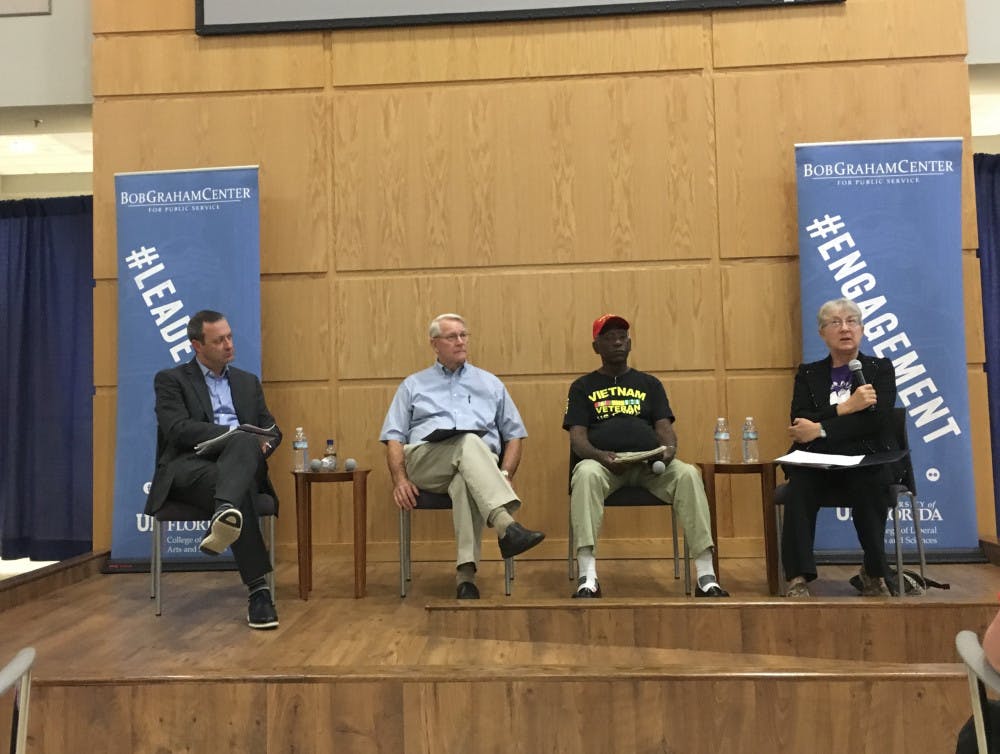Mary Bahr remembers the bandages.
She was a fresh-faced 23-year-old Air Force intelligence officer during the Vietnam War. She would sometimes visit soldiers under nurse’s care.
One day, as someone turned off the lights to celebrate a soldier’s birthday with a cake and candles, all Bahr saw was the tiny candle flames glow on a mass of white bandages that hid the soldier’s damaged face blown by a landmine.
“I tell this story now because I think people need to stop romanticizing war,” Bahr said, noting she used to never tell it.
Bahr, now 73, was one of three Vietnam War veterans who spoke at 6 p.m. Tuesday at Pugh Hall Ocora for a panel discussion called “Revisiting the Vietnam War.” About 60 people attended the event, which was co-sponsored by the Bob Graham Center for Public Service and the Samuel Proctor Oral History Program, said Shelby Taylor, a Bob Graham Center spokesperson.
“Vietnam is a pivotal moment in our nation's history,” Taylor said. “It's important to revisit these crucial events and examine how they impact and inform our politics and policy today.”
The panelists discussed the role of technology in the war, American involvement and war protests. They also shared their feelings on Post Traumatic Stress Disorder. The conversation was moderated by Matthew Jacobs, a UF history associate professor.
The event was hosted to honor the 50th anniversary of the Tet Offensive, which started at the end of January 1968, Jacobs said. The Tet Offensive was a turning point in the Vietnam War that marked the beginning of American withdrawal.
Paul Ortiz, the UF Samuel Proctor Oral History Program director, said the panelists are all Gainesville residents who volunteered to speak. The panelists have previously worked with the history program, which conducts oral-history interviews with veterans.
In addition to Bahr, the panelists included Cornelius Clayton, a 74-year-old U.S. Army combat veteran, and John LeMoyne, a 74-year-old U.S. Army lieutenant general veteran and Purple Heart recipient.
When Clayton came home from the war, he said he hid his PTSD from everyone and slept with a gun under his pillow.
But after seeking help and finding solace in prayer, his mental health improved significantly.
“The stuff that went through in my head — I could’ve blown my brains out,” he said. “But God kept me on the right side.”
LeMoyne said during the war thousands died due to combat, suicide and drug overdose.
“Was it worth it?” he asked.
Steve Landay, a 75-year-old Gainesville resident, said he attended the event with his wife because they wanted to thank the panelists for their service.
“As citizens, we need to question the wars we enter,” Landay said. “We need to appreciate the young people who are fighting now.”





![Photo of the missing Leachianus “Leachie” gecko. [Photo courtesy of Mike Southwick]](https://snworksceo.imgix.net/ufa/907bd92a-0b29-40eb-a5fb-d7db7cf98b2f.sized-1000x1000.jpg?w=1500&ar=16%3A9&fit=crop&crop=faces&facepad=3&auto=format)
